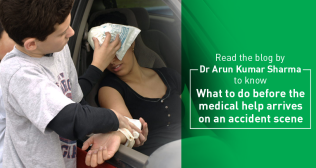
Emergency and Trauma
What You Need to Know About ICU: Full Form, Meaning and Use
admin Jan 08, 2025
An intensive care unit (ICU) is a specialised section in a hospital dedicated to providing critical care and life support to critically ill or severely injured patients. Admission to an ICU typically requires a referral from the doctor or specialist unless it is an emergency.
What type of patients are cared for in the ICU?
An ICU provides critical care for patients who require close monitoring with advanced medical support, such as:
- Severe trauma patients: Individuals with life-threatening injuries from accidents or surgeries
- Post-surgical patients: Patients who have undergone major or high-risk surgeries and who require constant monitoring
- Respiratory distress cases: Patients with respiratory diseases or have conditions such as severe pneumonia who require to be on a ventilator
- Cardiac emergencies: Patients who had a myocardial infarction or heart failure; arrhythmias that require close surveillance
- Neurological cases: Patients with neurological disorders, including head injuries, cerebral vascular accidents or epilepsy necessitating specialised treatment
- Severe infections: Patients with sepsis or other infections requiring immediate intervention
- Organ failure cases: People who require kidney dialysis or support for other organ failures, such as those in the liver or kidneys
- High-risk pregnancy complications: Postnatal mothers and babies with complications that need intensive intervention
Types of ICU
- Medical ICU (MICU): This type of care is provided to patients with complicated medical conditions such as respiratory failure, severe infection or septicaemia, multi-organ dysfunction and neurological conditions. MICU is well suited for offering specialised care to patients with severe medical conditions that need close observation and application of sophisticated medical procedures.
- Surgical ICU (SICU) The unit is meant for patients who require critical care after certain surgeries. Common problems in the SICU include monitoring and dealing with complications that might arise after the surgery, such as pain management and proper wound dressing.
- Cardiac ICU: A cardiac ICU provides care for patients with critical heart-related ailments. This encompasses patients diagnosed with heart attacks or congestive heart failure, arrhythmias or those who had cardiac surgery.
- Neonatal ICU (NICU): This unit cares for sick infants who require special attention immediately after birth. This unit deals with infants with respiratory distress, temperature stabilisation and nutritional management. The NICU concentrates on the general development of the newborn, which requires intensive medical supervision.
- Paediatric ICU: This is specifically designed for children with critical illness. The PICU include children with profound respiratory problems, major trauma, critical sepsis and congenital anomalies. The care in the PICU is age-sensitive, as well as support in having healthy emotions for the children and their families.
ICUs differ from regular hospital wards in several ways
- Level of care: ICUs provide a higher degree of care than conservative hospital wards.
- Staffing: ICUs have an increased medical staff-to-patient ratio compared to the medical wards. This comprises the critical care physician, critical care nurse and any other specialist involved in critical care. This ensures patients get more than standard and intense attention as soon as they are admitted to the hospital.
- Equipment: ICUs use technological equipment and monitoring apparatus. This includes ventilators, heart monitors, dialysis machines and other life-support systems not typically found in regular hospital wards.
- Patient monitoring: Patients are continuously monitored 24/7, allowing for rapid response to any changes in their condition. In contrast, regular wards have periodic monitoring.
- Types of patients: Patients in ICUs are usually those with life-threatening conditions, severe injuries or those recovering from major surgeries. Regular hospital ward caters to patients with less critical conditions who do not require intensive monitoring.
- Environment: The ICU environment is slightly different from other wards in terms of the control of infection risks and the aseptic conditions of the ward.
- Visitor policies: ICUs are more selective when allowing visitors policies to ensure the safety and well-being of patients. This includes limited visiting hours and restrictions on the number of visitors.
Conclusion
ICUs are vital parts of modern healthcare facilities, providing continuous monitoring and medical support for critically ill patients. With specialised equipment and an expert medical team, the unit ensures the best possible care for life-threatening conditions.















